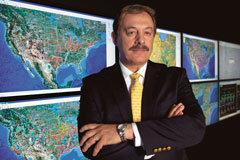September 13, 2017
Mohammad Shahidehpour to present Electrical and Computer Engineering Distinguished Lecture Sept. 14

Mohammad Shahidehpour, director of the Robert W. Galvin Center for Electricity Innovation at Illinois Institute of Technology, will present "Smart Cities for Promoting Global Sustainability" at 3 p.m. Sept. 14 in 1109 Engineering Hall.
A smart city will offer an integrated solution for managing a region's large and interdependent infrastructures including the electricity grid, natural gas supply system, telecommunication system, urban traffic and congestion management, smart vehicles including EVs, buses and urban trains, water supply system, waste water management, urban farming, smart street lights, municipal government system including urban security — physical and cyber — and public works. A smart city solution will enhance the efficiency of public services, meet city resident's critical needs, improve the quality of life, and promote the global sustainability. Accordingly, a smart city will be more prepared to respond to everyday challenges than a traditional monitoring system which considers a simple transactional relationship with individual citizens.
A smart city is an urban development for integrating multiple information and communication technology and Internet of Things solutions in a secure fashion. The integrated smart city solution will enhance the performance and the interactivity of urban services, reduce costs, manage resource consumptions, and will ultimately improve security, reliability, resilience and sustainability in large metropolitan regions. The integrated solution will allow smart city officials to interact directly with community members and those in charge of critical infrastructures, in order to manage what is happening in the city, how the city functions are evolving, and how the city can enable a better quality of life in normal and stressed conditions. The information gathered through the use of smart sensors, that are integrated with real-time monitoring systems, is the key for mitigating inefficiencies in smart cities. The pertinent city data are collected, processed and then analyzed with the goal of improving the management of urban flows and allowing for real-time responses to unforeseen challenges.
This presentation will introduce the components and the structures embedded in smart cities and discuss the benefits and the predicaments of implementing smart cities for promoting the global sustainability. An overview of a campus microgrid established at the IIT campus will also be presented.
Shahidehpour is a university distinguished professor, Bodine Chair Professor of Electrical and Computer Engineering. He also has been the principal investigator of several research grants on power system operation and control. His project on Perfect Power Systems has converted the entire Illinois Institute of Technology campus to an islandable microgrid. His Center for Smart Grid Applications, Research, and Technology, or CSMART, at the institute has promoted the smart grid cybersecurity research for managing the resilience of wireless networked communication and control systems in smart cities. His SPIKE initiative facilitated the design and the implementation of affordable microgrids in impoverished nations. He is the recipient of the 2009 honorary doctorate from the Polytechnic University of Bucharest.
Shahidehpour was the recipient of the Institute of Electrical and Electronics Engineers' Burke Hayes Award for his research on hydrokinetics, IEEE/PES Outstanding Power Engineering Educator Award, IEEE/PES Douglas M. Staszesky Distribution Automation Award, and the Edison Electric Institute's Power Engineering Educator Award. He has co-authored six books and 500 technical papers on electric power system operation and planning, and served as the founding editor-in-chief of the IEEE Transactions on Smart Grid.
Shahidehpour is a fellow of Institute of Electrical and Electronics Engineers, fellow of the American Association for the Advancement of Science, and a member of the U.S. National Academy of Engineering.
